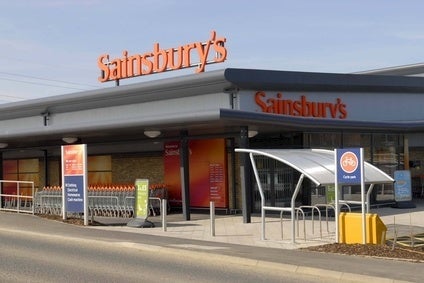
The annual results from UK grocer Sainsbury's have underlined the pressure mainstream supermarkets in the country are facing as discounters continue to gain market share. Mainstream headlines focused on a property writedown-led loss but falling sales and underlying profits at Sainsbury's highlighted the challenges facing the business.
1. Sainsbury's is not alone in struggling to find top-line growth
The supermarket saw a 1.9% fall in like-for-like sales for the year to 14 March, with underlying pre-tax profits down more than 14%. The results were another sign UK supermarkets in general continue to feel the backlash as a result of the growth of the discounters. Rivals Tesco and Morrisons have seen sales come under pressure in recent quarters and, Richard Clarke, analyst at Sanford Bernstein, says Sainsbury's, like its competitors, is "trying to be more efficient in its business and much more actively trying to find cost savings in its business."

Discover B2B Marketing That Performs
Combine business intelligence and editorial excellence to reach engaged professionals across 36 leading media platforms.
2. Manufacturers are safe … for now
Will Sainsbury's look to suppliers to reduce the pressure on its own profits? Keith Bowman, analyst at Hargreaves Lansdown, says supermarket operators are trying to pass "some pressures down the line" but says this is less practised at Sainsbury's than some of its rivals because the retailer prides itself on its "differentiated – more of a quality – offering". When it announced its half-year numbers in November, the retailer said it planned to invest an additional GBP150m in price in a bid to remain competitive. The question is whether manufacturers will be expected to spend their own margins to support the cost of promotions? Probably not, for now, given the focus from most supermarkets to cut back on promotions. Clarke says: "No-one is going to be looking for manufacturers to fund an ever increasing number of promotions. In fact what I think they'll be looking to do is having a much more stable relationship with their suppliers whereby they just have a fixed price. There will be some promotional activity of course, but I think in general they want to have a fixed price per unit relationship".
Clive Black, analyst at Shore Capital, however warns if Sainsbury's aim is to remain price competitive, it "will mean balancing its own margin investment with supply chain contributions". He says: "If the market lurches down again then both can be expected to be drawn upon."
3. Quality needs to be pushed more
Sainsbury's has been keen to retain its core trait of quality, says Black. And it's this "quality" which sets it apart from its rivals. Bowman says it puts Sainsbury's in a position where it almost justified in demanding a higher pricepoint from its consumer, because of its quality offering. He argues Sainsbury's needs to push harder on quality, even in a market where, for many consumers, price is one of if not the most important factors in their purchasing behaviour: "Sometimes there is a price to pay for some additional quality if you like," he says.
4. And it's all about the range
Sainsbury is openly proud about stocking things its competitors do not. Over the years it's even tailored its ranges to meet the needs of local communities. Clarke makes mention of Sainsbury's execs talking of one of the Jordans cereals it sells, which its competitors do not. "One of the advantages is they have is a good range. They like the fact they sell some products that other supermarkets don't. I don't think Sainsbury's will see a huge drop in its range, it'll continue to look at its range – it's always done that, there's nothing new there. And it's done a 3% reduction in its range in the last year – that's nothing compared to say the 20% cut that Morrisons is looking at".

US Tariffs are shifting - will you react or anticipate?
Don’t let policy changes catch you off guard. Stay proactive with real-time data and expert analysis.
By GlobalData5. Sainsbury's to look in-house to reduce costs
The retailer cut 500 roles at its support centres and in April this year, a further 800 roles at its stores. That's likely to continue believes Bowman. While Sainsbury's is looking to pursue cost savings in an aggressive manner, that does not necessarily mean from suppliers. "Some of that will come from improving their supply chain. We've already seen them announce job cuts in their own staff and operations".
6. What the Sainsbury/supplier relationship is going to look like
"Difference" is key here. The company said yesterday (6 May) it "will continue to focus on areas that our customers care about". To stand out, Sainsbury's is going to be looking for more "exclusive" products from suppliers, says Clarke. "Anything the manufacturers can do to make the Sainsbury's offer more attractive – so by providing more exclusive products without cluttering the store with too many SKUs – will help." And price will continue to be important. Part of that will also come from becoming "more efficient" in its own-label products.





